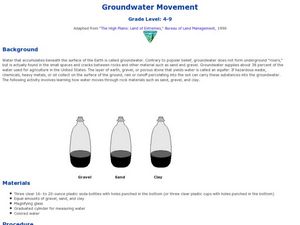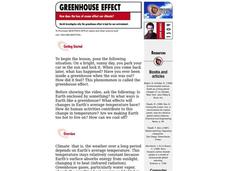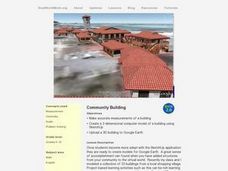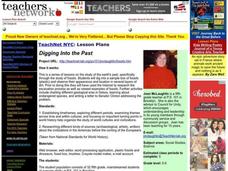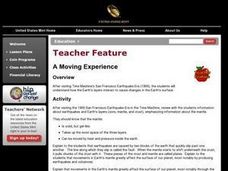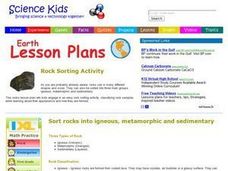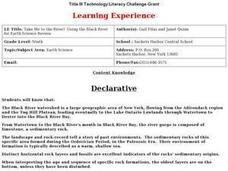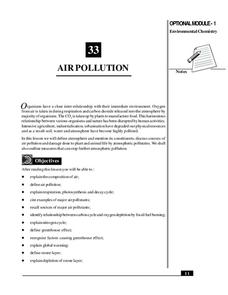Curated OER
Weather
In this earth science worksheet, students use the clues given at the bottom of the sheet to solve the crossword puzzle related to weather. They identify various cloud types and how they are formed. Students also identify atmospheric...
Curated OER
Ring of Fire
Students locate some of the 1,500 active volcanoes on a world map. Then by comparing their maps with a map of the world's tectonic plates, they discover that volcanoes occur because of the dynamic nature of the Earth's lithosphere.
Curated OER
Groundwater Movement
Students study groundwater movement beneath the surface of the Earth. In this agriculture lesson, students experiment with how water moves through rock materials such as sand, gravel, and clay.
Curated OER
Rocks and Minerals
In this earth science worksheet, students use the clues given at the bottom of the sheet to solve the crossword puzzle on mineral and rocks. They identify the various types of rocks formed and specific examples of these rocks.
Curated OER
Blazing Gas
Fourth graders read and discuss the sun and the energy we use on Earth from the sun. In this sun lesson plan, 4th graders discuss the solar system, planets, and answer short answer questions.
Teacher Created Resources
Problem and Solution: By Jove, I Think You've Got It
Through grand conversation, help scholars identify issues that harm the Earth and find solutions on how to solve them. After voting—on what your class deems the most important problem—stretch writing muscles with a problem-solution...
Curated OER
Albedo and Irradiation of Surfaces
Here is a physical science activity where pupils place thermometers inside of a white and a black paper pocket and place them under a lamp. They record and compare the temperature increase over a ten-minute period. Have your class...
Curated OER
Soil Porosity, Moisture Content, pH, and Density
This lab activity does not have to be done with AP environmental scientists. It can also be done with middle to high school earth scientists. The procedures aren't complex. Learners determine the density of dry and wet sand in order to...
Curated OER
Investigating Properties of Water: Temperature
Investigate how temperature affects the density of water and stratification that occurs in bodies of water when temperatures vary. Water of differing temperatures is given different colors to see the layers that form. The lesson is meant...
Curated OER
Ocean Streams
The instructions for demonstrating ocean turnover are provided in this resource. You could set this up for your earth science class as part of a lecture on convection currents or as an explanation of how ocean currents form. An animation...
Curated OER
Greenhouse Effect
Pupils investigate the greenhouse effect. In this environmental lesson, students investigate why the greenhouse effect changes the climate through an experiment. Pupils use vinegar to simulate how acid damages the environment.
Curated OER
Community Building
Students build different shapes using sketches. In this geometry lesson, students explore measurements and units as they build and create models of buildings. They use SketchUp to create and manipulate shapes.
Curated OER
Watch This Space!
In this space activity, students, with a partner, answer five questions about the universe and read and discuss ten questions regarding astronomy.
Curated OER
Digging Into the Past
Fifth graders study fossils and how they are charted. In this fossil lesson plan, 5th graders research the excavation process of discovering fossils, and view fossils. They then do a hands on activity that involves plastic fossils that...
Curated OER
A Moving Experience
Learners visit Time Machine's San Francisco Earthquake Era. They understand how the Earth's layers interact to cause changes in the Earth's surface. They review information about earthquakes and Earth's layers.
Curated OER
Rock Sorting Activity
Students organize rock samples according to their properties. In this earth science lesson, students predict whether they are igneous, metamorphic or sedimentary. They compare their prediction with the actual type.
Curated OER
The Atmosphere Then and Now
Students recall details about the formation of the earth and early atmosphere. They name the layers of the atmosphere and compare amounts of atmospheric nitrogen, oxygen, and argon. Formulate questions about global warming.
Curated OER
A Model of Three Faults
Students investigate faults. In this science lesson, students explore the many stresses and strains in the earth's layers and research the types of faults in their state.
Curated OER
Take Me to the River! Using the Black River for Earth Science Review
Ninth graders use maps to identify landscape regions and drainage patterns producing the Black River. They create PowerPoint presentations pertaining to the Black River watershed, its geologic history and highlighting safe rafting...
Project SMART
Rocks and Minerals: Touch the Earth
Students complete a unit of lessons on rocks and minerals. They conduct research, write e-mail questions to geologists, write daily journal entries, label maps demonstrating types of rocks/minerals found, and create a web page that...
Curated OER
Mighty Earth Movers
Note that although the publisher lists almost all of the Common Core standards for both math and language arts, you will most likely want to take the general topic and choose which area to focus on. Regarding math, pupils measure worms...
Curated OER
Tropical Rainforests
Students create their own rainforest environment. This tropical rainforest lesson, introduces where rainforests are located, their real world connections, and their structural make up. It includes further resources online.
National Institute of Open Schooling
Air Pollution
Seventy percent of the air pollution in China is due to car exhaust. Under the umbrella of environmental chemistry, learners extensively explore air pollution. From the makeup of our atmosphere to sources of major air pollutants, classes...
Polar Trec
What Can We Learn from Sediments?
Varve: a deposit of cyclical sediments that help scientists determine historical climates. Individuals analyze the topography of a region and then study varve datasets from the same area. Using this information, they determine the...


